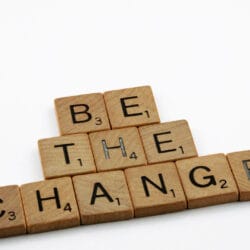Whilst we all want to feel as though our lives are individually meaningful, many people…
We often hear about the advantage in how you should let go of toxic people in your life, but what about the disadvantages to letting go? You may be surprised.
We are more embracing of talking about mental health these days, which is progress in itself, but identifying and recognising toxicity that exists around us is only half the battle, as we need to be able to release it too, and do so without becoming toxic ourselves to others.
You see, toxicity is like a virus or a foggy cloud that can pass through people, so even when we become aware of our own or others’ toxic behavioural patterns (often forged through initial fight or flight coping strategies), we have to also become aware of our responsibility to stop the virus from spreading further.
Too often today we hear advice of ‘owning’ our truth and standing up for being wronged by others, but unless we take ‘responsibility’ alongside our ‘rights’ to be our own person, we can end up wronging others with this often overlooked empowerment-to-entitlement shift.
This is important to recognise because toxic environments don’t just affect our own self-esteem and environmental conditioning, but can also affect our future if we become bitter ‘toxic throwaways’.
That said, what we generally associate with toxicity is how someone or something else affects our own well-being and mental health, and so it’s best to address this first and how toxic environments can sabotage our minds from their potential.
How Toxic Environments Sabotage Our Ability To Think Straight (& How To Recognise You Are In One)
If you’ve ever been in a toxic relationship or had narcissistic people taking control of your life then you will very likely know the frustration that comes with toxic environments.
You may also feel frustrated but also powerless to get out of such a toxic environment or situation.
This is especially true when you have a toxic or narcissistic parent, a partner you live with, or a narcissistic boss. You can feel completely powerless because you don’t think there’s any way out of such an environment, all the while being dragged further into gaslighted self-doubt.
“They can drain your mental and emotional resources, hijack your sense of self, infect your mood and outlook on life, create stress and unhappiness, make you doubt your feelings and experiences, slow or sabotage your progress, and pull you away from healthy, empowering, uplifting relationships”.
What makes toxic environments and people so damaging is how you don’t see it coming at first.


That boss may give you good first impressions to lure you in. The relationship may start out with innocent enough lust and possibly genuine feelings. And parents tend to have the best interests of their children at heart but can lack the skills to nurture them in the right way due to their own unresolved toxic environments they grew up in.
So, recognising you are in a toxic environment is the first thing we have to do.
Often toxicity and narcissistic people come hand-in-hand, and so if you can spot the cycle of a narcissist’s game then you can more easily identify whether you are falling into a toxic trap.
The cycle generally follows the pattern of:
Idealising
This is hard to see at first as someone can come across as being nice and genuine, but becomes easier the more this cycles around through tactics like ‘love-bombing’ The general (often unconscious) aim here comes from a place of insecurity in how the narcissist needs to feel loved by finding an easy target that looks like a vulnerable puppy i.e. someone need of love themselves and easier to control.
This may be obvious in terms of a relationship, but in work this might be preying on those desperate for an income by offering them the ‘chance’ to make something of themselves, or having a parent who makes you feel like you need them (but without giving their child space to make their own mistakes).
Devaluing
This is where the pain starts. You get sucked in by the narcissists need to feel in control. If there’s any sense of a narcissist losing their grip over you they will try and create a sense of self-doubt in yourself so you think of them as superior or ‘right’. This may start with innocent enough teasing or downplaying of achievements etc. Note though that whilst most relationships have an element or play and teasing, nitpicking to make the other person feel bad about themselves so they feel good about themselves is a sign of narcissistic tactics at work.
What’s sad about this stage is how no one wins. The abused feels worse and worse about themselves, and the narcissist may not even realise they are doing it, as in their mind they are simply trying to feel worthy enough for their ‘prey’ to still idolise them. The issue is this devaluing starts occurring after the idealising, so the victim has now reached a point of confusion, where they thought they were being unconditionally praised or trusted only to then wonder what they’ve done ‘wrong’ to not have that anymore, so they fish to do better and this plays into the narcissists control game.
At work, you see this when a good employee never gets a promotion despite their hard work, as they are too dependent on their boss’s approval so a narcissistic boss will keep them working harder for as little reward as possible. A parent would devalue their children’s ability, or set unrealistically high expectations of their children so their children feel disheartened and useless. A partner may reprimand their other half more and more for little things like not doing the dishes, not ticking certain boxes, or bring things up in the past to use against their partner to try and make their other half feel worse about themselves (i.e. make the narcissist feel better by making it seem like the partner is at fault). They may also gaslight you, give you silent-treatment for when you don’t meet their demands, and isolate you from friends and family by making you out to be horrible to them (emotional manipulation), and find ways to gang-up on you.
Discarding
This stage then takes the toxic abuse further to the point where you know you are now in a toxic environment but feel such low worth that you can’t shake the toxic cloud. It hovers above you and you now don’t see beyond the day clearly. It’s here where the victim’s trust will be repeatedly violated. The toxic abuser will project their own insecurities onto the victim, and they may even cheat and lie behind the victim’s back. They have devalued the victim so much they don’t value them at all as people. They sabotage them for their own gain.
Often you will see narcissists put on a show in public to be seen as perfect whilst having their own abused victims around them forced to praise them, afraid not to. They have them under their thumb. Then once they don’t have the rush anymore from devaluing so much they throw away and look for the next victim. One of the worse parts about the ‘Discarding’ phase is how the abuser will ‘play the victim’, and everything they have done to the real victim, they deny and ‘reverse victim’ themselves to make it seem as though they are the ones being wronged, all the while isolating the real victim from getting the help and support they really need.
In work, you may see examples of discarding when a boss uses their employees over and over with threats of being fired if they don’t work overtime etc. A parent may refuse to see they are bad-parenting by placing blame on their children for everything even when it’s them who were emotionally unavailable. A partner may betray their other half by cheating on them and then blaming the partner for it, or purposefully spending their partner’s money, or give extended silent treatment to their captive until the victim breaks and rages out in frustrated anger (which then allows the narcissist to play the victim).
Hoovering
You would think by this point no one in their right mind would ever return to such a toxic environment, but by now the victims have such low worth in themselves, and possibly have become so isolated from healthy supportive people, that they are so desperate now for any praise just to feel human. And who comes along and does that? The narcissist. They swoop back in after a while of discarding and present more love-bombing, cycling round to the idealisation phase again. The more this goes on the more confused the victim of toxic behaviour gets, not knowing whether they are lovable or not. Their soul has been broken so they accept the hoovering.
How To Get Out Of The Toxic Cloud (& Why Looking To The Future Is So Important To Do So)
Whilst finding support and obvious self-help practices (such as exercising, meditation, eating right etc.) can also help you cope with living around toxicity, they don’t necessarily help you get out of them for good.
For that, we need to learn how to look forward rather than backwards.
Of course, seeking therapy and working out that you are a victim of toxic abuse is necessary if you are blind to it, as is finding supportive friends and family who will listen (if possible), but it shouldn’t be the only port of call.
That’s because whilst therapy helps us look deeper within, it’s often backwards rather than forward, whilst can trigger us, and friend and family bias may take some personal guilt in your unhappiness if you unload too much on them (and then that cloud just gets passed around in drama triangles).
Recognising the patterns is one thing, releasing our mind to be more adaptable to be able to change the patterns is quite another, and arguably the most important point to avoid being hoovered up back into toxic environments.
It’s hard to look to a future when your mind is full of fog and doubt, but one way we can is to learn to visualise a different life you want for yourself, like we used to dream as younger children.


If we are trauma-bonded since childhood it can feel like our past memories are only negative, whilst any good ones are likely buried beneath the more impacting negative ones, and so to counter this we have to create new ones which is where the imagination/memory interaction comes into play.
These functions are found in the same region of the brain, but one is backwards-thinking, and one is forward-thinking.
If our past is full of traumatic memories it will only trigger our nervous system and weaken our immune response. And if all we are experiencing is pain and toxic abuse, we will have severe deficiencies in dopamine and neurotransmitter problems (hence the brain fog).
There’s a reason why you should not have continuous counselling. It takes a toll on our body as it brings up a lot of unconscious hurt, and this then depletes our motivation to change, making an uncertain future seem scarier, and making us more likely to stay within a harmful but familiar cage.
Instead, our brain needs signals that make it feel better in the moment, but also to heighten our motivation and dopamine supply for tomorrow.
What we have to do then is to seek to build up these transmitters with a good balance of chemicals.
Whilst you will likely have heard advice to meditate and do exercises like yoga, to reduce cortisol and release serotonin, they are short-lived if we don’t have a bigger picture to look forward to.
If we keep looking backwards or seeking to blame our abuser for a toxic environment we only repeat instances of cortisol production, and likely then seek out ‘bad dopamine’ through instant gratification arguments or even drug addiction to ease the pain.
What we need is to give ourselves situations of ‘good dopamine’, where we can find small wins each day and set mini-goals for ourselves.
Getting our brain to look forward is the best cure we have. It doesn’t aim to mask our problems like medication, but actively tries to give our brain focus to move on from them so we don’t need to be dictated by them.
Of course, being stuck in environments around toxic people makes this a challenge, and so it becomes doubly important to find minutes or hours, whatever we can, where we are not around that environment and to get outside and practice visualising a better world for our brain.
Over time, with practice, we start building up new connections again, and we start adapting to situations differently.
To truly get rid of toxicity that sabotages our future potential we need to get in control of our own future, and therefore our aim should be to become a transition person who doesn’t seek to be a victim of the past (despite this often being true), but instead seeks to be our own creator of tomorrow.
This requires an adaptable mind to take on a different perspective to the one conditioned in us to be under the controlled spell of others i.e. one that gets stuck in the past.
To do this, we need to also recognise that not every argument, disagreement, or past experience is toxic. It’s too easy to go and place blame in someone else’s court when we feel unjust, which is where ‘toxicity responsibility’ comes in – and possibly a hard truth to hear.
How A Lack Of ‘Toxicity Responsibility’ Can Also Affect Us Negatively
It may seem obvious that a toxic environment is going to be negative to our outlook, but the challenge can sometimes be in recognising when we are about to get sucked into a toxic environment.
This is the hard part because we can blissfully and naively enter relationships, jobs, interactions etc. with good intent but not know the deeper conditioning, biases, and coping mechanisms of the people we are talking to.
All of us are affected by our upbringing and we don’t enter conversations leading with our troubled past (unless it’s a therapy session). We are socially conditioned to put our best ‘front’ on – to live behind the shield of our external successes and titles.
This shield stops us from seeing the real person underneath, not just in other people, but over time in ourselves too.
Then at some point, we may find ourselves in the midst of emotional confrontations or feelings with other people, but without the right tools in place to know how to deal with toxicity. i.e. we enter defence mode and blame other people (or situations) for being like they are instead of taking responsibility for our own ‘responses’.
Of course, we can very well be victims of other people’s toxicity and feel unjust in taking responsibility for someone else’s wrongdoing, but when we don’t accept our own part in our own decisions, that is when we end up becoming more embroiled in this toxic tango.
In time, our decision-making skills worsen the longer we are in toxic environments, confidence falls, and we find ourselves in a trap we can’t get out of.
Blaming others for it, even if it’s very much ‘their fault’, actually just absolves us from our responsibility to heal too, and in turn as a result only brings up more resentment and toxicity, sabotages our own view on people, and stunts our ability to make decisions towards creating a better future for ourselves.
You may well have heard that the most productive way to move forward and away from challenging encounters is through forgiveness, but when you are in a toxic environment and someone has made you their victim it can feel like the last thing you want to do is to forgive them, but this act allows your brain to move on and get out of the victimhood you really don’t want to be in.
You’ve heard the advice before to ‘let go of toxic people in your life‘, and whilst people generally mean well with that recycled advice, it can lead us to be bitter and even entitled in how we put ourselves then before everyone (even if we are understandably trying to bring up our self-esteem again), and it can unconsciously lead us to look at others with distrust and suspicion. This only plays havoc with our nervous system and we deserve better than to allow our future to be affected by others in our past in this way.
Therefore, as counter-intuituve as it may sound we should be careful in how we ‘let go of toxic people in our life’, and be mindful of the consequences of doing so the wrong way (or of cutting people out of your life so quickly).
3 Reasons Why You Should Beware Of The ‘Let Go Of Toxic People In Your Life’ Mantra


Reason #1: People All Just Want To Feel Enough (& Likely Didn’t Need Support Too)
Of course, if your health, sanity, or life is in danger because of toxic abuse then you need to be looking after yourself first-and-foremost, setting boundaries, going no contact where possible, and seeking out support, but once you’ve got your mind to a point of understanding your situation one of the best ways to move from it is to actually start empathaising with the pain the person causing you pain is going through.
Not to feel sorry for them or to excuse anything they’ve done to you, but doing this can make it far easier for you not to ‘look up to your captor’. Instead, you put yourself in a position of power, as you know they are just insecure and actually quite weak people.
When you have a narcissist trying to bring you down and sabotaging your own life and potential future, they only continue to do so when they know they can devalue you, so when you start feeling sorry for their position you gain strength back in yourself, as well as weaken their grip over you.
It’s easy to forget ‘toxic’ people are really just people in need too, often more in need, and lacking emotionally in many ways. Often people who became toxic were a product of a dysfunctional environment themselves, often as children, where they had no say in what happened to them, and are often just crying out for affection and support, but without the healthy ego to know how to do so in a healthier way. It’s become coping strategies that they;ve learned to survive in dire circumstances.
The more we can be ‘transition people’ the more we can become the bridge to stop this insecure virus passing from generation to generation, which will also give you a lot of strength moving forward.
The alternative of cutting someone out to protect ourselves might sound like what we need, but as victims we have become all too familiar with feeling guilty, and even doing this to our captor can lead to guilt in ourselves at cutting someone else out.
Generally, as social beings, we don’t feel good giving someone else the silent treatment, even if we are doing it as part of protecting ourselves. We will feel better when we know we are stronger than someone else, and where we can offer them hope of getting therapy themselves, rather than just casting them out.
Of course, narcissists rarely take up therapy and will likely make you feel you need it and not them, but just knowing you are in that position to make decisions about your own wellbeing, rather than being made to feel small by them, can free up your mind to not need their approval anymore.
It can help to remember that a toxic person is likely to have very low self-esteem and not much praise in life too, as they create a vicious circle and drama triangles that just attracts negativity back in their face and which makes them worse, so instead of seeking to bring them down and play into their own drama triangle game we are better off being the bigger person and taking responsibility for our reaction to them.
Reason #2: Disagreements Can Become Toxic Reasons To Abandon, Instead Of Possible Mistakes To Learn From (& Check Our Own Ego)
Whilst toxic environments are not a place we want to reside, we have to be careful in how we can end up judging any environment that breeds disagreement as automatically being toxic.
We see this a lot today where people end up becoming far too sensitive and anxious by being offended by anything just to play the victim and seek sympathy. Younger people are growing up with this virtue-signaling ideology that they need to be the victim to be heard, when doing so only makes them weaker-minded and that won’t help them get out of a toxic environment, but it’s actually more likely to see them find or even create toxic environments themselves that didn’t need to be.
Acting this way also plays into the hands of narcissist who can then ‘cry victim’ themselves through the reverse victim tactic, and what you end up with is a constant merry-go-round of blame and victimhood that isn’t so merry at all and just brings you down further, and doesn’t get you any closer from being free from a toxic environment.
Disagreement and mistakes in life are a healthy part of life and so we need to be able to know the difference rather than blend any challenge into being part of a toxic environment, as when you do this is becomes too easy to lose sight of what actually is toxic and what isn’t.
Toxic environments aside, interactions that have disagreements and debate can be a chance to learn from them, as can mistakes we make, rather than see us be afraid to make any as anxiety will only build if we become too obsessed with the idea of the perfect relationship or else.
In fact, some toxic relationships end up building because of this vain idea of having to tick all the boxes rather than just let each other be, and if you are in a toxic relationship with a narcissist who tries to control you or belittle you for not being perfect, then you can become freer in yourself when you know you absolutely don’t have to, and it’s an unrealistic requirement.
Sometimes, working on these issues can help us repair relationships before they become too toxic or suffocating, as often toxic environments take time to be created and are usually developed as a result of stale and rigid thinking, so before we jump out to ‘let go of toxicity at the first sign of it’, instead we might want to consider how a toxic environment might only develop if we are too rigid in our thinking.
This means putting our ego in check and developing anti-fragility. Relationships can be saved from entering toxic clouds when we do.
With a heightened ego, people refuse to see other opinions as valid and will do what they can to protect their inflated ego over admitting that someone else may have a point. Accepting difference of opinion and healthy debates on our side might stop the other person from becoming so determined to prove you right. What sends people into toxicity is when their ego or control is threatened, so defusing in this way can help alleviate or avoid a toxic environment completely.
Remember, narcissists are actually like lost souls desperate to find self-worth too, so actually helping them find a healthier way to feel that worth can stop them from finding it through controlling you.
Another reason to check our own ego is because people like to think they are more valid or valued by being the one who ends a relationship or who makes the last call, but again, this is an unhealthy way to try to gain control. It’s not done out of power but out of force, and is more likely to just lead the narcissist in the relationship be even more aggravated.
Reason #3: Beware The Anti-Toxic Toxic Culture (& A Missed Chance Of Antifragility)
Finally, there’s another knock-on effect in not seeing the danger in avoiding disagreements.
Our biases can end up seeing us miss opportunity, or develop a thicker skin where we can get stronger, not weaker, from challenging environments, through antifragility.
This is like the difference in someone who mopes around after being hurt, and someone who uses it as fuel to get better and improve themselves.
Those who mope around are more likely to go into flight or fight response, seeking validation in what happened to them, staying in victimhood, and protecting their ego by refusing to listen to anyone else for guidance.
It becomes the other person that needs to change rather than them.
The problem here is it can create a blind spot in our attention and create a resistance in hearing anything that doesn’t fit into their expected biases or false-positive mantra (like how some people might be conditioned to shake their heads at this article).
That’s the making of toxic positivity, and this can lead into avenues where people can keep telling themselves, ‘I’m amazing’, ‘I’m strong’, ‘I don’t need no…’, ‘they’ll never change’ etc.
What generally happens here is that instead of really working on their own self-esteem people can fall into pockets of collectives, looking for others to validate how they have been wronged and so they feel justified in being about to blame others rather than take responsibility to get out of that environment for good.
The problem here is in how you may end up isolating yourself further into ‘isms’ and groups, creating divisions, biases, and echo chambers, and only seeking consensus in what you want to hear rather than what is actually good for you to be able to move on form the toxic environment.
Instead it creates distrust in others and assumes the worse in people rather than the good, and as a result creates a ‘toxic throwaway’ culture that is toxic in itself, rather than seeks to fix things at the root.









